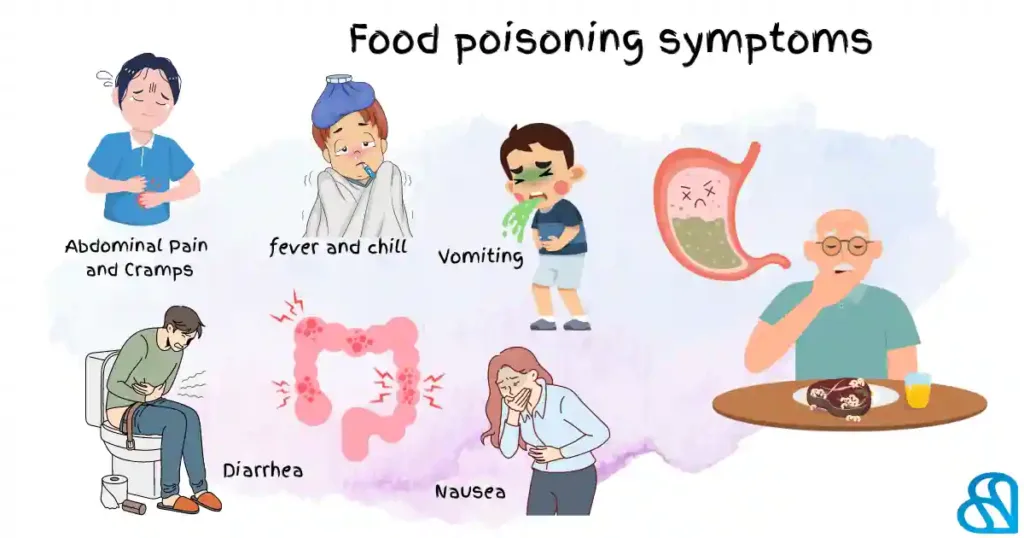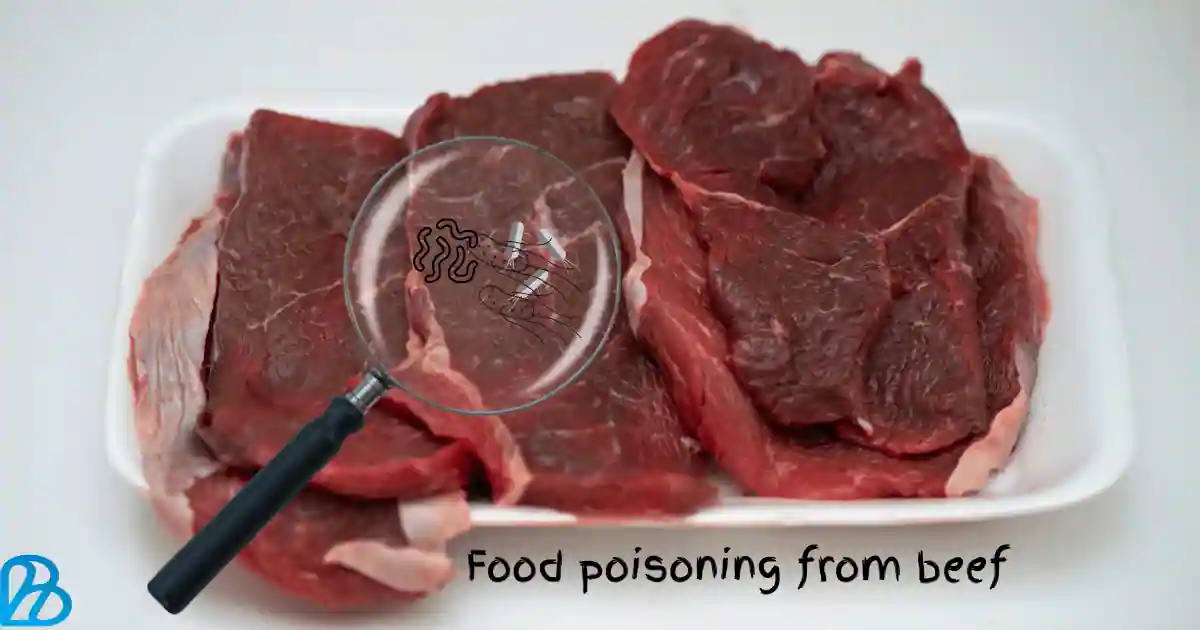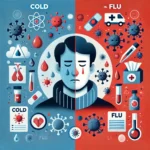Experience stomach cramps, nausea, vomiting, or diarrhea? Signs of food poisoning from beef could be the cause. Learn more about symptoms and treatment.
Introduction-Signs of Food Poisoning from Beef
From sizzling steaks to hearty stews, beef is a staple in many kitchens worldwide. But along with its delicious taste and nutritional benefits, beef can pose some significant risks when it comes to food poisoning.
Food safety is paramount, and beef’s potential for harboring pathogens demands extra care. Many foodborne illnesses stem from the mishandling of beef meat, often leading to distressing symptoms ranging from mild to severe. In this detailed exploration, we will dissect the signs and symptoms of food poisoning from beef, how to prevent it, and why it’s critical to understand the risks associated with your meat before you cook it.
Also Read- Monthlies; 15 Most Effective Home Remedies For Menstrual Pain
Long-term effects of food poisoning from beef
Long-term effects of food poisoning from beef are significant, mainly when the root cause is a dangerous pathogen such as E.coli or Salmonella. Patients often recover fully from these incidents within a week or so. However, severe cases can lead to long-lasting health issues. For example, Hemolytic Uremic Syndrome (HUS) is a painful condition caused by E. coli infections, which may result in harm to other organs and renal failure. Other potential long-term effects include chronic arthritis, brain and nerve damage, and, in rare cases, death. Understanding these risks underlines the importance of handling and cooking beef properly to ensure it is safe for consumption.

3 Common Types of Food Poisoning from Beef
Beef can be a source of several bacteria that lead to food poisoning. Here are the most common culprits:
1. Coli Infection
Escherichia coli (E. coli) bacteria reside in the intestines of people and animals and can cause severe food poisoning if transmitted through undercooked ground beef or surface-contaminated vegetables. Symptoms typically include painful stomach cramps, diarrhea (often bloody), and vomiting. Some strains of E. coli can lead to more severe diseases like Hemolytic Uremic Syndrome (HUS), which can cause kidney failure.
2. Salmonella Infection
Salmonella bacteria can be found in raw or undercooked beef or other meats and can cause salmonellosis. Symptoms include diarrhea, fever, stomach cramps, nausea, and vomiting. According to the CDC, salmonella causes around 1.35 million infections annually 26,500 hospitalizations and 420 deaths annually.
3. Campylobacter Infection
Campylobacter jejuni causes food poisoning, and people can detect it in raw beef, unpasteurized milk, and untreated water. Symptoms include diarrhea, cramping, abdominal pain, and fever, typically within two to five days after consumption.
Also Read- What are Signs of your First Period-Menstrual Health Awareness Month

4 Signs and Symptoms of Food Poisoning
Recognizing the warning signs of foodborne illness is crucial for taking immediate action. The most common symptoms include:
1. Nausea and Vomiting
These symptoms can be alarming and can start from as little as 30 minutes after ingestion of contaminated beef. While vomiting can be the body’s way of ridding itself of harmful substances, it also leads to dehydration.
2. Diarrhea
Diarrhea is the body’s way of removing the pathogen. It can be hazardous for young children and older people, who can quickly become dehydrated.
3. Abdominal Pain and Cramps
Stomach pain and cramps often accompany food poisoning. Mild discomfort to crippling pain are possible outcomes, which can mimic the symptoms of other severe conditions, such as appendicitis.
4. Fever and Chills
A fever is a common sign that the body is fighting off an infection. It can come and go or persist for several days, indicating a more severe case of food poisoning.
Also Read- Allergy Symptoms – 16 Signs You Should Not Ignore

When to Seek Medical Attention
In most cases, food poisoning resolves independently; the primary treatment is hydration and rest. However, under certain circumstances, medical intervention is necessary:
– Severe or Persistent Symptoms
If vomiting and diarrhea are severe or do not subside after a day or two, it’s crucial to seek medical attention to prevent dehydration and potential complications.
– High-Risk Individuals
People with weakened immune systems, such as the immunocompromised, young children, and older people, are more likely to experience severe food poisoning symptoms. They should see a doctor as soon as they suspect an infection.
Prevention and Safe Handling Practices
Prevention is always the best course of action regarding food safety. Here are some guidelines to minimize the risk of beef-related food poisoning:
– Proper Cooking Temperatures
Cook ground beef at 160°F (71°C) to kill dangerous germs such as E. coli and salmonella. Use a food thermometer to be sure.
– Storage and Refrigeration Guidelines
You should store beef at a temperature of 40°F (4.4°C) or below to slow the growth of bacteria. Use refrigerated beef within 3-5 days and frozen beef within 3-4 months for best quality.
– Cross-Contamination Prevention
Keep raw beef apart from other food products and wash your hands, cutlery, and surfaces that come into contact with the meat to stop the bacteria from spreading.
Also Read- Winter Flu Season- 10 Home Remedies for Beating the Flu This Winter–
Case Studies and Outbreaks
To underscore the importance of vigilance in food safety, let’s examine a notable food poisoning outbreak related to beef consumption.
Ground Beef E. coli Outbreak
In 2018, an E. coli outbreak linked to ground beef affected people across several states in the U.S. The contaminated meat caused 177 illnesses, leading to severe cases and one death. The outbreak emphasized the need for strict adherence to safe handling and cooking practices to avoid such tragic cases.
Conclusion
Foodborne illnesses from beef can be severe, but understanding the signs and when to seek medical help can make a significant difference. By following stringent safety guidelines and being aware of potential risks, you can enjoy your beef dishes with peace of mind.
Remember, an extra minute of handwashing or an additional check with a food thermometer can mean the difference between a delightful meal and an unexpected trip to the hospital. Food safety is everyone’s responsibility, and as consumers, we hold the power to protect our health through education and mindful practices.
As you continue to explore the culinary world of beef, Keep this thorough information handy for a safe and happy dining experience with loved ones. Let food safety be the secret ingredient to every dish you prepare – a decision that’s always well done.
Hi there! I’m content writer and blogger. With over two years of experience, I’ve shared my passion for writing across various platforms. I firmly believe in the transformative power of words and look forward to sharing this journey with you. Enjoy my work!










